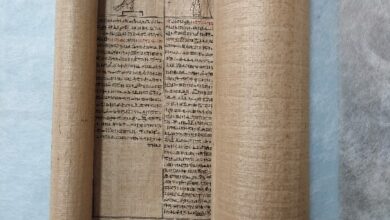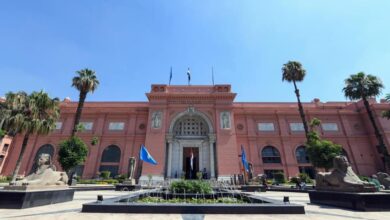Thousands of Islamists flocked to Tahrir Square on Thursday night to take part in the protest being called the "Friday of Popular Will," setting up a large podium in the square.
Members of the Muslim Brotherhood have sat around the podium in order to prevent any clashes or disputes around it.
“We sat here because this is our podium and we are here to protect it. We don’t want any clashes,” said Ahmed Mokhtar, a young activist affiliated with the group.
The group's youths wore T-shirts carrying the Brotherhood label, a move described by other activists as an attempt by the group to display its full force.
“Of course [the Brotherhood has] the right to come to Tahrir and join the million-man march but this is simply an exercise of showing muscles,” said Hassan Abu Okaily, who identified himself as a relative of one of the martyrs of the revolution. “They sat in front of the podium without consulting anybody. Their members are touring the square to tell people, 'We are here and we are the strongest.'”
On Friday, protesters in Tahrir will mark their twenty-second day of the sit-in. Some revolutionary forces there have severely criticized Egypt’s military rulers for its hesitation to hasten reforms and accelerate the trials of the former regime figures.
The Supreme Council of the Armed Forces (SCAF) has responded by criticizing the secular movements behind the sit-in, alleging that groups such the April 6 Youth Movement are receiving foreign funds.
Islamist forces have thus far criticized the sit-in, saying that it threatens relations between the military and revolutionary forces.
Ahead of Friday’s protest, there are fears that clashes will take place between the Islamist forces – mostly represented by the Brotherhood and the Salafis – and the secular forces in the square. Political groups agreed on Wednesday and Thursday to unify the square during Friday’s protest under certain demands.
The demonstration's demands include stopping military trials for civilians, limiting the authority of SCAF while granting full authority to the cabinet to eradicate corruption and purge pro-Mubarak officials, removing the attorney general, and promptly prosecuting Mubarak and his former aides.
“These are demands that everybody agreed on. We discussed what’s common between the political forces and we sidelined the demands that were disputed,” said Mohamed Badawy, a member of the Brotherhood's Freedom and Justice Party.
However, some members of the Salafi movement said that they would not join the protest if the SCAF insists on adopting the demand made by some secular forces to have a list of binding constitutional provisions for any future committee responsible for drafting the new constitution.
“People expressed their opinion in the referendum. They said that they want elections first and after the elections a committee that will draft the constitution,” said Ahmed Nasser Abdel Meguid, a member of the Salafi movement. “Some want to speak on behalf of the people and set an unchangeable list of provisions. That’s simply not fair.”
“We are here only to say our demands in a peaceful way. We will not let any clashes erupt in the square,” said another Salafi member, Ali Mohamed Hosni.
Having a secure square has been the pivotal concern of the political forces participating in Friday’s protest.
“Despite the positive nature of the sit-in, we suffered a lot from disputes and clashes during it, and now we are determined not to have any kind of clash,” said Gaber Fathi, one of the demonstrators who has been in the square since 8 July.
During the 22-day sit-in various clashes have broken out between different groups in the square. Street vendors were forcibly evacuated twice for allegedly stirring up trouble. Some members of the popular committees who handle the square’s security arrested people they alleged to be thugs and reportedly tortured them.
“Such things are not going to happen again. We have popular committees consisting each of three members: one from the Brotherhood, one Salafi, and one from the forces participating in the sit-in, to solve any problems in the square,” said Mohamed al-Hassan, an independent activist.
Despite the security concerns, an air of festivity prevailed in the square ahead of the protest. The usual face painters toured the square, drawing the Egyptian flag on people’s hands at a cost of LE1. Youssef Fahmy, a university student, is doing it for free.
“I thought to do something that would bring joy to the kids in the square,” he explained. “As you can see most of the conversations are so tense. I’m doing this as a break from the discussions.”
Close to the Brotherhood podium, Atef Mohamed held a stick covered with rosaries that he was selling to people.
“I came here many times and I was here during the revolution. But I heard that this is the Friday of Sharia, so I thought that it might be a good idea to come with rosaries, as the square would be full of religious people.”
“Some of us hoped that they would have a rest today,” Abu Mohamed, a tea vendor who set a small table in front of the Mugamma government building, said of the protesters. “People are afraid that fights will erupt between the Salafis and the people in the square.”




